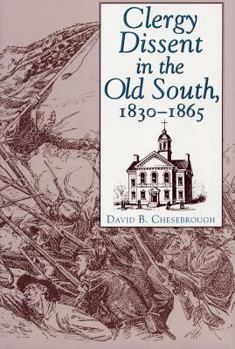Clergy Dissent in the Old South, 1830 - 1865
Emphasizing the courage required and the cost of dissent before and throughout the Civil War, David B. Chesebrough identifies dissenters among the southern clergy, tells their stories, and discusses the issues that caused these Christians to split from the majority After an opening chapter in which he provides an overview of the role of the southern clergy in the antebellum and war years, Chesebrough turns to the South's efforts to present...
Format:Hardcover
Language:English
ISBN:0809320800
ISBN13:9780809320806
Release Date:December 1996
Publisher:Southern Illinois University Press
Length:168 Pages
Weight:0.80 lbs.
Dimensions:0.5" x 5.5" x 8.5"
Customer Reviews
2 ratings
God Bless Those Who Oppose Oppression
Published by Thriftbooks.com User , 20 years ago
Are ministers the moral barometers of society? Do they set the moral positions of their congregations or reflect their congregation's biases? Those are questions of significance, and David B. Chesebrough has spent his career seeking to understand them within the context of the greatest divisive period in American history, the fight over slavery that eventually led to civil war. In this short and easily read volume Chesebrough seeks to explore the role of southern ministers who went against the grain of southern society and politics first to contest slavery and later to stand with the Union in opposition to secession and Civil War. Using a series of interesting case studies, Chesebrough suggests that the role of ministers in the sectional conflict was more complex than has been documented elsewhere. In spite of ostracism, coercion, and sometimes lynching, a few southern clergy stood up for antislavery principles throughout the period. After the creation of the Confederacy a small but vocal group of ministers opposed secession and war. Many of them met violence and death, justified by those inflicting it because of a "traitorous" stance toward the new government of Jefferson Davis. Chesebrough tries to draw broader conclusions of the role of dissenters in southern society in the last chapter, using Arnold Toynbee's "creative minority" conception to characterize antislavery southern clergy. Toynbee argued that in any civilization only a small minority understands the current challenges and conceives new answers that offer a way out of present crises. If that "creative minority" is stifled or ignored the civilization will ultimately fail. While one may quibble with Toynbee's assertions, Chesebrough finds in them a striking saliency when considering southern antislavery clergy. This is all very well, and Chesebrough has provided a service by documenting this dissent. Several large questions, however, await further consideration. Are there instances where this "creative minority" of southern antislavery clergy fundamentally affected the course of the sectional conflict? If so why, if not why not? Also, what role did the clergy play in mediating the divisiveness of the age? In a society as fractured as antebellum America would not the clergy naturally be called upon to ensure justice for all Americans, heal wounds, and find middle ground? Rather than crystallizing the extreme positions concerning slavery, perhaps the truly "creative" clergy in the South were those seeking both racial justice and political compromise.
God Bless Lincoln? I Reckon Not Here
Published by Thriftbooks.com User , 24 years ago
Religion has always played a major role in the affairs of men and nations. However, we seldom read about its' significance. David B. Chesebrough has written this fascinating book called "Clergy Dissent in the Old South". In his book, Chesebrough describes how Southern society created tremendous pressure for its citizens to conform to the acceptance of slavery as a way of life and finally to succeed from the Union. Unfortunately this society also pressured the Christian clergy to pervert its' faith and not only condone slavery but promote it as well. The southern clergy provided encouragement to the Southern people throughout the civil war. Even after the fall of Vicksburg and Gettysburg in 1863, the southern clergy remained a major catalyst in prolonging the inevitable collapse of the southern cause by turning the civil war into a holy crusade. The author describes how the major Protestant churches (Methodist, Presbyterian, and Baptist) in the Old South split over the issues of slavery and succession. Rarely were dissenters tolerated. Merely to speak against slavery or to pray for Abraham Lincoln could be considered an act of treason. Dissenters either kept silent, fled north, or faced the possible consequence of being lynched. This book describes the stories of some of these heroic dissenters. This is an excellent book. Any one interested in learning about the Old South and the civil war, needs to be a student of its' religious make up. The author has thoroughly researched this subject matter and he has presented it in a very readable book.




